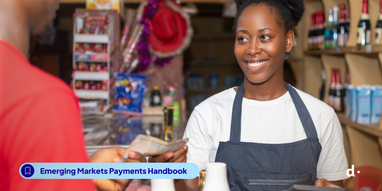Payments in the Middle East: A blend of heritage and modern innovation

National payment networks, real-time rails, and mobile-driven consumers are transforming the Middle East into a hub of digital payment innovation.
What you need to know
- Digital commerce in the Middle East is entering a new stage of growth. Across markets like Türkiye, Saudi Arabia and the UAE, payment innovation is changing how consumers shop and pay.
- Saudi Arabia’s Mada processed nearly 9 billion transactions last year, while Türkiye’s credit card installments power around 40% of online purchases.
- Real-time rails like Türkiye’s FAST process millions of daily transactions, modernizing payment infrastructure.
- In the UAE, advanced banking infrastructure and strong remittance flows have made it a hub for regional payment transformation.
- eWallets already represent around a third of Saudi Arabia’s payment mix, matching debit card adoption.
- The region’s eCommerce growth shows no signs of slowing, powered by digital-savvy, mobile-first consumers.
- This blog continues our series based on dLocal’s Emerging Markets Payments Handbook 2025.
How payments are powering Middle Eastern growth
The Middle East is becoming one of the most dynamic regions in global payments. Tradition and technology coexist here, creating a landscape that feels both deeply local and remarkably modern. From Saudi Arabia’s smartphone-driven economy to Türkiye’s card-led eCommerce culture, each market brings its own approach to digital payments.
This isn’t just about following global trends. Across the region, local payment systems are taking the lead: from Saudi Arabia’s Mada network, which processes billions of transactions each year, to Türkiye’s Troy cards, serving millions of users. These homegrown systems show how regional solutions can compete with global payment networks while serving local needs.
Governments are playing a central role in this progress. Central banks and regulators, from SAMA in Saudi Arabia to the UAE’s financial authorities, are introducing fintech licensing, open banking frameworks, and inclusion policies. At the same time, many Middle Eastern economies are moving beyond oil, investing heavily in sectors such as tech, gaming, and online retail.
The numbers speak for themselves. Saudi Arabia has 97% smartphone penetration, Türkiye’s eCommerce market is projected to grow by around 50% by 2027, and the UAE’s banking penetration exceeds 99%. Yet each country is advancing at its own pace, guided by distinct regulations, consumer habits, and economic goals.
The mobile-first generation driving change
Demographics are destiny in Middle East payments. The region’s young, mobile-savvy population is driving adoption patterns that favor digital-first solutions over traditional banking relationships.
This generation doesn’t just use mobile payments, they also expect them. They’ve grown up with smartphones as their primary computing device and see no reason why payments should require anything else. This expectation is pushing merchants, banks, and fintech companies to prioritize mobile optimization in everything they build.
Saudi Arabia: National push toward a digital-first economy
Saudi Arabia represents the Middle East’s most dramatic digital shift. With 97% smartphone penetration and a young, tech-savvy population, the Kingdom has created an environment where digital payments are becoming the new normal.
Mada, the national payment scheme, has emerged as the backbone of Saudi digital commerce. Processing nearly 9 billion transactions in 2024, Mada handles over 90% of domestic debit transactions. This is a complete reimagining of how a nation pays. It’s also part of a broader national push to diversify beyond oil, with digital sectors like gaming emerging as important engines of economic growth.
The eCommerce landscape reflects this transformation. Debit cards and eWallets each represent around 30% of online transaction volume, showing how quickly eWallets have gained ground against traditional payment methods.
Saudis are embracing alternative payment flows that align with their mobile-first lifestyle. BNPL options are also gaining momentum, as consumers look for more flexible ways to manage spending. Cash is still present, but this figure is declining as trust in digital payments grows.
Türkiye: Credit culture meets digital innovation
Türkiye’s payment ecosystem tells a different story. One where traditional credit culture is being built on rather than replaced by digital innovation. Credit cards remain the dominant force in eCommerce, capturing over 60% of online transaction share.
What makes Türkiye unique is how it has adapted credit to the digital age. More than 40% of online credit card payments are made through installment plans, reflecting a deeply embedded cultural preference for spreading costs over time. This isn’t just about affordability, it’s about how Turkish consumers prefer to manage their financial commitments.
Troy, Türkiye’s national card scheme, has issued over 42 million cards, creating a local alternative to international networks. Meanwhile, eWallets account for one in ten online transactions, showing steady but measured growth in digital payment adoption.
The infrastructure supporting this growth is impressive. Türkiye’s FAST real-time payment system processes 3.5 million transactions daily, providing the backbone for instant transfers and modern payment flows. BNPL services are expanding too, reflecting consumers’ continued interest in installment-based payments.
UAE: Global hub with local innovation
The United Arab Emirates (UAE) represents one of the region’s most mature digital payment ecosystems, combining high income levels with sophisticated financial infrastructure. With a GDP per capita of almost $50,000 and banking penetration above 99%, the Emirates have created an environment where digital innovation can flourish.
The UAE’s position as a regional business hub also means its payment innovations often influence neighboring markets. Success in the Emirates often sets an example for neighboring markets. It’s also one of the world’s top remittance corridors, with cross-border transfers playing a major role in both consumer and merchant payment flows.

Real-time rails transforming regional commerce
Across the Middle East, real-time payment systems are becoming the foundation for modern commerce. Türkiye’s FAST system demonstrates how instant payment rails can support both consumer and business needs.
These systems aren’t just about speed. They create new possibilities for how money moves through the economy. Real-time rails enable everything from instant merchant settlements to peer-to-peer transfers, supporting the growth of digital marketplaces and mobile commerce. The development of these systems also reflects broader regional priorities around financial sovereignty and local control over payment infrastructure.
Key takeaways
- The region’s young, mobile-native population is driving demand for digital payment experiences that work across all channels.
- Local card schemes like Mada and Troy are strengthening financial sovereignty across the region.
- Real-time systems such as Türkiye’s FAST are setting new standards for instant, always-on commerce.
- The UAE’s advanced banking infrastructure and strong remittance flows make it a regional hub for payment innovation.
- eWallet adoption continues to rise, expanding across the region. Installments and BNPL options are also reshaping consumer spending habits.
- With regulators enabling fintech growth and open banking, the Middle East is entering a new phase of connected digital commerce.
What’s next in this series
Next up: Latin America’s hybrid payment ecosystem, where cards and alternative payment methods create unique opportunities for global merchants. We’ll explore how markets like Brazil, Mexico, and Colombia are building payment systems that serve diverse consumer needs, with insights drawn from dLocal’s Emerging Markets Payments Handbook 2025.
Disclaimer: Türkiye is included under the Middle East region in this handbook for consistency with regional market grouping and comparative analysis, even though it is geographically and economically connected to both Europe and Asia.
Get in touch with our payment experts
We help global companies such as Amazon, Spotify, and Microsoft find new opportunities in high-growth markets. Let's think outside the box for tailor-made payment solutions for your business. Fill out this form, and we'll get back to you as soon as possible.
Contact us




